
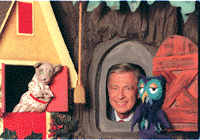


There's a neighborhood in Pittsburgh where everyone is special. For 28 years, the residents have lived together in harmony, showing each other respect and love. In the turbulent world around it, this neighborhood has managed to sustain itself by preserving the pure and simple values of its number one citizen.
"Mister Rogers' Neighborhood" is not an actual place on an Allegheny County map, but it's a state of mind for the cast and crew who produce the award-winning children's television program inspired by its creator, Westmoreland County native Fred Rogers.
As Rogers prepares to accept his 31st honorary degree May 11 at North Carolina State University's commencement in Raleigh, he looks back at a career that has taken him to new heights in the development of children's programming - yet not far from his hometown of Latrobe.
Born in 1928, he grew up in a loving extended family that included his father, James Rogers, who worked at the McFeely Brick Co., one of Latrobe's largest employers at the time, owned by his wife Nancy's father, Fred McFeely.
In fact, several references in his television show stem from his childhood, such as the trademark cardigan sweaters he wears on each episode. His mother knitted a sweater each month, Rogers recalled, and gave them as Christmas gifts to family and friends. (One of his famous sweaters is a part of the Smithsonian Institution's Museum of Natural History in Washington, D.C.).
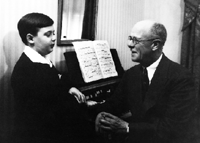 Another
personal reference is the character Mr. McFeely, the Speedy Deliveryman played
by David Newell who carries on Rogers' material grandfather's name. And
the McFeely house on the "Mister Rogers" set is patterned after his grandparents'
residence at 750 Main St., Latrobe. "My grandfather built that house," Rogers
noted. "When my grandmother moved from Pittsburgh to Latrobe, she thought it
was the jumping-off spot of the world."
Another
personal reference is the character Mr. McFeely, the Speedy Deliveryman played
by David Newell who carries on Rogers' material grandfather's name. And
the McFeely house on the "Mister Rogers" set is patterned after his grandparents'
residence at 750 Main St., Latrobe. "My grandfather built that house," Rogers
noted. "When my grandmother moved from Pittsburgh to Latrobe, she thought it
was the jumping-off spot of the world."
Rogers' underlying theme of the unique value of each human being, emphasized to his preschool audience as he tells them, "You are special ... I like you just the way you are," also came from his grandfather McFeely who told the young Fred that "You made this day special just by being yourself. Remember there's just one person in this world like you, and I like you just the way you are."
He remembered, as do the 8 million families who tune in his message on some 315 public television stations, including WQED in Pittsburgh, in addition to cable stations in several foreign countries. And Rogers' genuine feelings of caring and sharing are contagious to those who work with him at Family Communications Inc., producers of "Mister Rogers' Neighborhood."
One of his strongest supporters is Hedda Sharapan, associate producer of the program and one of Rogers' longtime friends. At a recent taping of a new series of shows on the theme "Helping," Sharapan watched as a musical group from Kenya now living in Ambridge known as Jabali Afrika played its interpretation of one of the many "neighborhood" songs Rogers has written, "Tree Tree Tree." After they sang and played the repetitious chorus of "Tree, tree, tree, tree, tree, tree ... We love you, yes we do. Yes we do, we love you" on their native instruments, Rogers told the musicians off-camera, "The children will really love this."
"That was so beautiful," Sharapan agreed from her seat behind the cameras. Turning to a visitor, she pointed out that "One of his (Rogers') beauties is he can hear things from a child's perspective."
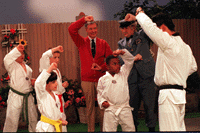 Later
in the week, he was filming a segment with a group of students of Tae Kwon Do
from Kim's Martial Arts in Brentwood. As the children watched a playback of
one of the takes, Rogers turned to director Bob Walsh and commented, "The children
will be so excited when they watch this."
Later
in the week, he was filming a segment with a group of students of Tae Kwon Do
from Kim's Martial Arts in Brentwood. As the children watched a playback of
one of the takes, Rogers turned to director Bob Walsh and commented, "The children
will be so excited when they watch this."
His concern for "the children" is so much of what makes Fred Rogers a friend to his audience, according to Sharapan. "He's a role model and not as the `perfect parent,'" she noted. "That's the last thing Fred would want. He's the significant other, a television friend, an ally supporting the family, Fred has said the best use of television is what happens when the program's over and children use what's been discussed."
Sharapan herself took Rogers' advice after she graduated from then Carnegie Institute of Technology (Carnegie Mellon University) with a degree in psychology and applied for a job with the program. "I came here because I love children," she recalled. "I met with Fred and he told me I should think about a master's degree in child development. He believed it's not so much what we give to kids on the set, but what are their inner dramas. Our dramas help them deal with them, he said." She took his advice and e ventually earned her master's degree from the University of Pittsburgh, working on the show as a volunteer at night. Sharapan is now one of Rogers' consultants on important issues of child development, and she also is the "spokesperson" for his philosophies, when she speaks to various groups and schools.
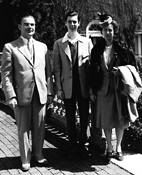 Rogers'
formal education includes a degree in music composition from Rollins College
in Florida and studies in child development in the graduate school of the University
of Pittsburgh. He enrolled at Pittsburgh Theological Seminary in East Liberty
and was ordained as a Presbyterian minister in 1962.
Rogers'
formal education includes a degree in music composition from Rollins College
in Florida and studies in child development in the graduate school of the University
of Pittsburgh. He enrolled at Pittsburgh Theological Seminary in East Liberty
and was ordained as a Presbyterian minister in 1962.
Between college and the seminary, Rogers worked as an assistant on "The Voice of Firestone," "The Gabby Hayes Show" and "The Kate Smith Hour" in New York. He eventually returned to Pittsburgh to join the first community-sponsored public television station in the country. His afternoon program, "The Children's Corner," with Josie Carey, established him as a well-known face in town. He then worked in Toronto on a show called "Misterogers" for a year before accepting an invitation from WQED to bring the program to Pittsburgh in 1966.
His theological training has influenced his philosophy toward children, but Betty Aberlin, a New York actress who comes to Pittsburgh when the scripts call for her long-standing role as Lady Aberlin in the "Neighborhood of Make Believe," calls it Rogers' "spirituality."
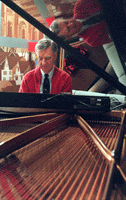 "There
are three parts to him: his spirituality, child development and music," Aberlin
remarked. "When I think of Fred, I think of the words to the Shaker song, `
'Tis a gift to be simple, 'tis a gift to be free ...' The neighborhood he creates
is guided by his heritage. It's a ministry, really."
"There
are three parts to him: his spirituality, child development and music," Aberlin
remarked. "When I think of Fred, I think of the words to the Shaker song, `
'Tis a gift to be simple, 'tis a gift to be free ...' The neighborhood he creates
is guided by his heritage. It's a ministry, really."
When asked to explain the longevity of "Mister Rogers' Neighborhood" in a culture where children are bombarded with music videos, animation and special effects, Aberlin says the "simplicity" of the show is one of its assets, "just the way in our time of Muzak, dead air on the radio is electrifying, or the way an a cappella choir will enchant you because everything is wired for sound."
Rogers explains the show's qualities as its unique relationship with its television "neighbor." He talks about such subjects as toilet training and divorce with the same openness he displays when he visits with a friend. "We try to understand the child and his needs," Rogers said. "Instead of clowns and balloons in a hospital, we show them an injection and we pretend about it. That says to the child, `the things I'm concerned about, I can ask about and play about.'''
He believes that "we're not meant to be razzle-dazzled ... that's not what life is." His purpose, instead, is discovering "a combination of what's appropriate to a certain age child, and the appropriate packaging."
The format of "Mister Rogers' Neighborhood" follows a predictable pattern that its creator says helps children feel more comfortable and open to learning about new things. During a "television visit," the viewer will see Mister Rogers' "television house," where his familiar routine of changing from his "work clothes" to a sweater and sneakers is his way of saying, "Let's relax together."
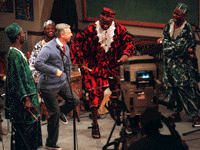 During
the half-hour program, he may bring something new to show to stimulate young
fans' curiosity and creative thinking, and he may have guests drop by - from
artists and musicians to pediatricians and plumbers - to share their interests
and friendship.
During
the half-hour program, he may bring something new to show to stimulate young
fans' curiosity and creative thinking, and he may have guests drop by - from
artists and musicians to pediatricians and plumbers - to share their interests
and friendship.
"And notice," Sharapan will point out, "It's not `how cereal is made,' but `how people make cereal,' with the emphasis on people's worth in the job they do and their pride in workmanship."
Before the show's end, Rogers summons his trolley to take viewers to the "Neighborhood of Make Believe," where the day's or week's theme is played out in a puppet story. Because he wants to separate the fantasy from reality, Rogers never appears in this part of the neighborhood, but his voice and puppetry skills are a major contributor to this segment.
He is the voice behind King Friday XIII and Queen Sara, rulers of the neighborhood, as well as X the Owl, Henrietta Pussycat, Daniel the Striped Tiger, Lady Elaine Fairchild (named for Fred's sister, Elaine) and Donkey Hodie. Sharapan said she doesn't think Rogers has a favorite among his puppet characters. "I really think they're all a part of him," she explained. "There are days when he feels shy like Daniel, or remembering the arrogance of someone puffing up his authority like the King, or being mischievous like Lady Elaine."
After the Neighborhood of Make Believe, the trolley returns to Rogers' house, where he offers a reassuring message to children and a closing song. Music is an essential part of his program, with the help of pianist Johnny Costa and music director Joe Negri, both of whom have been with Rogers since the show's beginnings. Rogers composes all of the music he sings on the show, from his signature "It's a beautiful day in the neighborhood" to the serious message in "What Do You Do With the Mad That You Feel (when you feel so mad you could bite?)"
When he spoke to one of the many groups of graduating seniors he is asked to address, Rogers paraphrased his song, "It's You I Like" and told the students, "It's you I like. It's not the things you wear. It's not the way you do your hair, but it's you I like. The way you are right now. The way down deep inside you. Not the things that hide you - not your diplomas, they're just beside you. But it's you I like, every part of you."
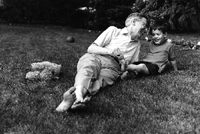 Sharapan
said he also likes to quote the passage from Saint-Exupery's "The Little Prince":
"What is essential is invisible to the eye," a saying he has framed in his television
studio office. His office is not where he does most of his writing, preferring
instead the solitude of his summer retreat on Cape Cod or the warmth of Florida
in January, where he goes to spend time with one of his two grown sons, John
and wife Mary. (Another son, James, his wife, Tory, and Rogers' two young grandsons,
Alexander and Douglas, live close by to his Squirrel Hill residence.)
He also rents a small room he calls "the writing office" less than two blocks
from the studio, where he goes when he needs some quiet time.
Sharapan
said he also likes to quote the passage from Saint-Exupery's "The Little Prince":
"What is essential is invisible to the eye," a saying he has framed in his television
studio office. His office is not where he does most of his writing, preferring
instead the solitude of his summer retreat on Cape Cod or the warmth of Florida
in January, where he goes to spend time with one of his two grown sons, John
and wife Mary. (Another son, James, his wife, Tory, and Rogers' two young grandsons,
Alexander and Douglas, live close by to his Squirrel Hill residence.)
He also rents a small room he calls "the writing office" less than two blocks
from the studio, where he goes when he needs some quiet time.
Whereas "Mister Rogers' Neighborhood" produced 64 shows a year in its infancy, these days 15 new shows are added annually to the others that are repeated throughout the year. Decreased funding for national public broadcasting was blamed for the cutback of new shows, Newell said, A grant from the Sears Roebuck Foundation enabled the show to continue on the air.
"We take the three weeks of programs and add them to the ongoing cycle. It keeps the series fresh," he explained. Timeles episodes such as the "School" week that addresses the issues of separation anxiety and new environments are repeated annually, but Newell said it is important to keep in touch with current issues in children's lives. "Our content has evolved over the past 25 years," he said. "We wouldn't have done a week on divorce back then or our two-part series on adoption."
Newell said he believes the show's success makes it able to withstand the changes around it. "We are timeless in a way, like `The Wizard of Oz,' he noted. "And 50 years from now, we will still be effective. Our programs' pace, intent, gentleness and purity will be the same."
Margaret Mary Kimmel, a professor in the Department of Library Science at the University of Pittsburgh, refers to Rogers as "a national treasure ... we're lucky to have him here." Kimmel, along with Mark Collins, a writing professor at Pitt, wrote the newly published book of essays about Rogers titled "Mister Rogers' Neighborhood: Children, Television and Fred Rogers" (1996, University of Pittsburgh Press).
Kimmel said their goal in collecting the 15 essays is to examine the world of Rogers and his influence over children's lives the past 40 years. "From Nancy Curry, who went to school with Fred; to Dave Boanuclli, who grew up watching him; to Lynette Cofer, who researched the effects of TV on young children, the contributors said thoughtful and carefully considered words about the work of a man of great integrity," Kimmel remarked.
Although Rogers was not involved in the writing or editing of the book, Kimmel said he was aware of it. He said, "Good luck, and I hope I like it," she recalled. "He called it a labor of love."
The three-year project is only one of the many tributes Rogers has received for his work. The Neighborhood has been nominated for 26 Emmy Awards and has won three. He also has earned the George Foster Peabody Award and dozens of others from special interest groups in early childhood, communications and education.
He is constantly in demand as a conference and commencement speaker, but many invitation are refused for lack of time. But he'll never ignore a letter from a fan. "We've kept all the mail over the years," Sharapan noted. "He answers every letter. The first thing he does in his office is to answer the mail." She said a book due out in September from Viking Press titled "Dear Mister Rogers" will showcase the variety of fan mail he has received - from serious to warm and funny, and from children to adults.
To reach a larger audience, Rogers has created a series of books and videotapes that deal with the issues he talks about on television. They include series on children who have cancer that was funded by and distributed through the American Cancer Society, and a current project of materials for children in domestic violence shelters.
Aberlin said Rogers has broadened his acceptance of subjects he once though were taboo for preschool children. "I'm from a broken home," the actress explained. "I was a New Yorker who didn't know what having a father was like, let alone a brother or a kindly creator. I remember begging him to do a program on divorce, not understanding what his resistance would be. There was a time when Fred was so tender-hearted it hurt him to go into a hospital. He became so sturdy through the program."
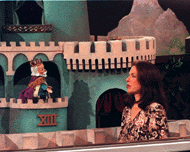 "Mister
Rogers' Neighborhood" has been a second home to the regulars who "live" there.
Besides Aberlin and Newell, "residents" include actor Chuck ("Neighbor")
Aber, whom Newell describes as "a kind of neighbor who takes on various roles,
sort of a one-man repertory company," Maggie Stewart, who plays Mayor Maggie;
Bob Trow, as the characters Bob Dog and Robert Troll; Audrey Roth as Miss Paulifficate,
and Negri, who owns Negri's Music Shop on the show and is a jazz guitarist.
The late actor and comedian Don Brockett was known as Chef Brockett on the show
and his part was not written out after he died because the programs are rebroadcast,
Sharapan explained, and it would be difficult for children to comprehend.
"Mister
Rogers' Neighborhood" has been a second home to the regulars who "live" there.
Besides Aberlin and Newell, "residents" include actor Chuck ("Neighbor")
Aber, whom Newell describes as "a kind of neighbor who takes on various roles,
sort of a one-man repertory company," Maggie Stewart, who plays Mayor Maggie;
Bob Trow, as the characters Bob Dog and Robert Troll; Audrey Roth as Miss Paulifficate,
and Negri, who owns Negri's Music Shop on the show and is a jazz guitarist.
The late actor and comedian Don Brockett was known as Chef Brockett on the show
and his part was not written out after he died because the programs are rebroadcast,
Sharapan explained, and it would be difficult for children to comprehend.
Other local talent behind the show's success include puppeteers Leonard Meledandri as Prince Tuesday, Bill Barker as Dr. Bill and Elsie Platypus, Betsy Seamans as Mrs. McFeely, Carol Switola as Anna Platypus, Mary Rawson as Cousin Mary, and Barbara Russell and the late John Reardon, who have had recurring roles as themselves, Reardon as the Opera Maker King Friday commands to create an opera when he so desires. "I love the operas," commented Aberlin. "They're a chance for Fred to kick up his heels and show his whimsical side."
 Any
of the cast members will confirm that Rogers is a shy person who dislikes the
bright lights and trappings his job includes. Rogers himself says that when
he has some free time, he prefers to stay at home rather than attend social
functions. When he does go out, "it's often to something musical," he noted.
His wife, Joanne, is a concert pianist and they enjoy attending musical
events together.
Any
of the cast members will confirm that Rogers is a shy person who dislikes the
bright lights and trappings his job includes. Rogers himself says that when
he has some free time, he prefers to stay at home rather than attend social
functions. When he does go out, "it's often to something musical," he noted.
His wife, Joanne, is a concert pianist and they enjoy attending musical
events together.
When they're in another city for on-location filming or to attend speaking engagements, Newell said Rogers "will invariably go to a bookstore or an art gallery he's heard about."
Rogers' daily routine at home and away includes a morning swim in a pool, and Newell said it's one of the few requests he makes when they travel. "He's not demanding, but he does swim laps everyday," Newell said, adding that he's already made arrangements for Rogers to use the campus swimming facility at North Carolina State University next weekend.
At age 68, Rogers realize his "neighborhood" can't go on forever, although Aberlin suggests it possibly could continue through the work of those who have been with him so many years. "He's gathered around him a group that could continue," she pointed out. "We're so obedient by now. There's no replacing Fred, but the characters still live. There are writers among us who could still write in Fredish (adding Fred's touch to English), and the music, there's enough for forever."
They've never talked about such plans, she noted, "because all of us are in it for however long he needs us. If you're a color in a painting, you don't go away. You want to see how the painting evolves."
 As
for Rogers, he hopes to be remembered as "somebody who cared for his neighbor
and his neighbor's children. We all need people to accept us as we are. That's
the only way we can grow."
As
for Rogers, he hopes to be remembered as "somebody who cared for his neighbor
and his neighbor's children. We all need people to accept us as we are. That's
the only way we can grow."
For the two generations who have already been blessed by the wisdom and love of Mister Rogers and generations who will follow, his "caring" has made him the ultimate "someone special."
"You are my friend, you are special, you are special to me. There isn't anyone like you, like you, my friend, I like you."
Candy C. Williams is a Pittsburgh free-lance writer.